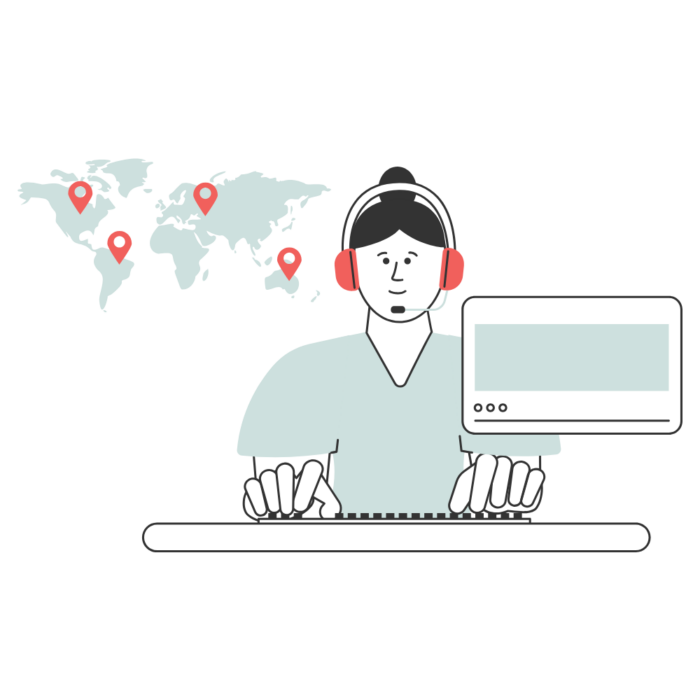Contact Center Solutions
Empower your team to provide exceptional service with our reliable contact center solutions and dedicated family-owned support.

What are Contact Center Solutions?
Contact center solutions streamline customer interactions across multiple channels, boosting efficiency for businesses. Enhancing customer experience and agent productivity, they’re vital for sales and service teams, facilitating continuous improvement through analytics and CRM integration.
ifonica’s Contact Center Solutions

Contact Center as a Service (CCaaS)
Contact Center as a Service (CCaaS), is a modern, cloud-based solution designed to empower contact centers with a suite of advanced communication and management tools.
Learn about ifonica’s Contact Center as a Service

Customer Support Outsourcing
Customer support outsourcing (also known as customer care outsourcing) is when an external vendor is contracted to provide customer service operations. Customer support outsourcing includes handling inquiries, complaints, and support tasks, and comes in many forms, including call centers, email support, live chat, social media management, and chatbots.
Learn more about ifonica’s Customer Support Outsourcing

Contact Center as a Service (CCaaS)
Contact Center as a Service (CCaaS), is a modern, cloud-based solution designed to empower contact centers with a suite of advanced communication and management tools.
Learn about ifonica’s Contact Center as a Service

Customer Support Outsourcing
Customer support outsourcing (also known as customer care outsourcing) is when an external vendor is contracted to provide customer service operations. Customer support outsourcing includes handling inquiries, complaints, and support tasks, and comes in many forms, including call centers, email support, live chat, social media management, and chatbots.
Learn more about ifonica’s Customer Support Outsourcing
Why Choose ifonica?
ifonica’s streamlined Contact Center as a Service (CCaaS) deployment provides an affordable solution for businesses of all sizes to engage more effectively with their customers. Our cloud-based contact center solution offers cost-effective and hassle-free deployment, enabling businesses to enhance service standards to meet modern customer expectations.
Customer experience is at the heart of everything we do. We are dedicated to providing you with exceptional service and ensuring your journey with us is seamless and satisfying. Our team is committed to understanding your unique needs, offering prompt and personalized assistance, and going the extra mile to make sure you feel valued and heard. Your satisfaction is our ultimate goal, and we continuously strive to exceed your expectations. Discover a new level of customer experience excellence with us.
Discover the advantages of adopting ifonica’s solution for your contact center.


We are here to help you
Commonly Asked Questions about Contact Center Solutions
The main difference between a call center and a contact center lies in the scope of communication channels and customer interactions they handle. while call centers primarily focus on voice-based communication, contact centers offer a more diverse range of communication channels to support customer interactions. Contact centers are often seen as more advanced and versatile than traditional call centers, as they adapt to changing customer preferences and embrace omnichannel communication strategies.
Call Center: A call center primarily handles inbound and outbound voice calls between customers and agents. Call centers typically focus on telephone interactions and may offer services such as customer service, technical support, sales, or telemarketing. The main communication channel in a call center is the telephone, and agents are trained to handle calls efficiently and effectively.
Contact Center: A contact center handles a broader range of communication channels beyond just voice calls, including email, chat, social media, SMS, and sometimes video calls. Contact centers aim to provide omnichannel support, allowing customers to interact with businesses through their preferred channels. In addition to traditional telephone support, contact centers may offer multi-channel support, self-service options, and integrated customer relationship management (CRM) capabilities. What is the difference between a call center and a contact center?
Successful contact centers focus on delivering great customer experiences across different channels, like phone calls, emails, and chats. They make sure agents are well-trained and have the right tools to help customers effectively. Reliable technology and flexible processes help them adapt to changing needs quickly. Using data and analytics helps them make smart decisions and improve continuously. And, of course, they prioritize keeping customer data safe and following rules and regulations. By focusing on these areas, contact centers can provide excellent service and support to customers.
A hosted contact center is a customer service solution where all the needed technology is managed by an outside provider in their own data centers. This means businesses don’t need to worry about buying and maintaining hardware or software themselves. They access the contact center tools through the internet. This model offers features like call routing, IVR, and analytics without the hassle and cost of owning and managing the infrastructure. It’s a flexible and cost-effective way for businesses to handle customer interactions and improve service quality.
Advantages of a hosted center include reducing operational costs by lowering both acquisition and ongoing support expenses, establishing predictable operating costs with a budget-friendly structure, and enjoying pay-as-you-go flexibility, aligning costs with actual requirements. Additionally, increased agility and flexibility allow for quick adaptation to changing circumstances, while IT resource optimization frees up IT resources for other critical needs and innovation initiatives. Efficient scaling ensures easy accommodation of both planned and unexpected growth, and cost-effective backup and disaster recovery measures ensure business continuity without excessive expenses.
Contact Center as a Service (CCaaS) is a solution that gives organizations the ability to manage all their customer interactions on channels such as voice, chat, SMS, email, social media, and video. CCaaS offers a significant benefit by enabling organizations to pay solely for the services they need, thus reducing IT and maintenance expenses.
While most CCaaS offerings are cloud-based, there might be instances where certain components or functionalities of a CCaaS solution are deployed on-premises or in a hybrid environment. Regardless of the deployment model (pure cloud, on-premises, or hybrid), the core features and functionalities of the contact center solution are accessible through a subscription-based model and managed by a third-party provider.
If your business desires a solution hosted entirely in the cloud, consider contact center cloud solutions. It leverages cloud infrastructure and services to deliver features such as call routing, queuing, agent management, and analytics without the need for on-premises hardware or infrastructure.
Both CCaaS and contact center cloud solutions are ideal for businesses looking to establish or expand their contact center operations while minimizing costs and maximizing efficiency.
Customer Support Outsourcing refers to the practice of contracting third-party service providers to handle customer service and support functions on behalf of a business. Instead of managing customer inquiries, complaints, and requests in-house, businesses delegate these tasks to external call centers, contact centers, or customer support agencies.
Customer support outsourcing in contact center solutions enables businesses to access cost-effective, scalable, and specialized customer service capabilities. These external providers typically offer a range of services, including phone support, email support, live chat support, social media management, and helpdesk services.
The main difference between inbound and outbound contact center solutions lies in the direction of communication and the primary purpose of the interactions:
Inbound Contact Center Solution: In an inbound contact center solution, the primary focus is on handling incoming communications from customers through phone calls, emails, chats, social media messages, or web inquiries. The main purpose of an inbound contact center is to address customer inquiries, provide support, answer questions, resolve issues, and assist customers with their needs or concerns. Examples of inbound contact center activities include customer service, technical support, helpdesk support, order processing, and handling general inquiries.
Outbound Contact Center Solution: In contrast, an outbound contact center solution involves initiating outgoing communications with customers or prospects. These communications are typically proactive and aimed at reaching out to customers for sales, marketing, or other purposes. Outbound contact centers often engage in activities such as telemarketing, lead generation, sales calls, market research, appointment scheduling, and customer follow-ups.
Call center analytics provide valuable insights for your business by monitoring performance metrics, identifying trends, and improving customer experience. By leveraging call center analytics, you can optimize agent performance, enhance operational efficiency, and enable predictive analysis for better decision-making. Overall, call center analytics empower your business to make informed decisions, improve customer satisfaction, and drive growth.
A virtual contact center solution is a cloud-based software platform that enables organizations to set up and manage contact center operations remotely, without the need for physical infrastructure or on-premises hardware. It allows agents to work from anywhere with an internet connection, providing flexibility and scalability for businesses. Virtual contact center solutions typically include features such as call routing, queuing, agent management, analytics, and integration with other business systems. They are ideal for businesses looking to establish or expand their contact center operations while minimizing costs and maximizing efficiency.